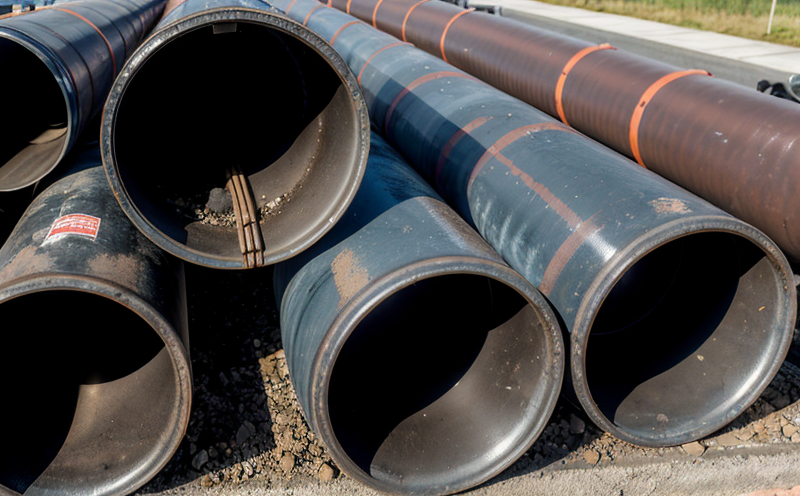ASTM F2164 Testing of Plastic Pipe Leak Integrity
The ASTM F2164 standard specifies a method to determine the leak integrity of plastic pipes under pressure. This test is crucial for ensuring that plastic pipes meet stringent quality and safety standards, especially in critical applications such as potable water distribution systems, irrigation systems, and industrial fluid transfer lines.
This testing procedure focuses on identifying any potential leaks or flaws that could compromise the functionality and longevity of the piping system. The test involves subjecting a pipe sample to a specified pressure for a defined period under controlled conditions. During this time, the integrity of the pipe is assessed by monitoring changes in internal pressure or observing external indications of leaks.
The ASTM F2164 protocol is particularly relevant for materials like polyvinyl chloride (PVC), cross-linked polyethylene (PEX), and high-density polyethylene (HDPE). These materials are widely used due to their durability, flexibility, and resistance to chemical corrosion. However, the integrity of these pipes must be verified before they can be installed in critical infrastructure.
The testing process begins with selecting a representative sample of plastic pipe that is cut into specific lengths. The samples are then carefully prepared by ensuring they are free from any external contaminants or imperfections. After preparation, the pipes are placed into a pressure chamber where they undergo a hydrostatic test. This involves gradually increasing the internal pressure within the pipe while monitoring for any signs of leakage.
The methodology outlined in ASTM F2164 ensures that the testing process is consistent and reproducible across different laboratories. The standard specifies precise parameters such as the type of fluid to be used, the rate at which pressure should be applied, and the duration of the test. This guarantees that all participants in the testing process are following a standardized protocol.
The results of the ASTM F2164 leak integrity test provide critical information about the quality and durability of plastic pipes. These results can influence important decisions regarding material selection, design modifications, and even regulatory compliance. By adhering to this standard, manufacturers and suppliers can ensure that their products meet industry best practices and are suitable for various applications.
The importance of ASTM F2164 testing cannot be overstated in ensuring the reliability and safety of plastic piping systems. This method helps prevent potential failures that could lead to costly repairs or even catastrophic accidents. By investing in rigorous testing, stakeholders can build trust with customers and meet stringent regulatory requirements.
Why It Matters
The ASTM F2164 testing of plastic pipe leak integrity is essential for several reasons:
- Prevents Failures: Ensures that the pipes are free from defects and can withstand pressure without leaks.
- Promotes Safety: Critical in applications like potable water systems where contamination could lead to health hazards.
- Enhances Durability: Helps identify weaknesses that might compromise the lifespan of the piping system.
- Regulatory Compliance: Ensures adherence to international standards and local regulations.
- Economic Efficiency: Avoids costly replacements and repairs by identifying issues early in the manufacturing process.
In summary, ASTM F2164 testing is a vital step in ensuring that plastic pipes meet the highest quality and safety standards. By incorporating this testing into their processes, manufacturers can enhance product reliability and customer satisfaction while complying with industry best practices.
Scope and Methodology
The ASTM F2164 standard outlines a comprehensive procedure for determining the leak integrity of plastic pipes under pressure. The scope of this test includes:
- Determining the ability of a plastic pipe to withstand internal pressure without leaking.
- Evaluating the effectiveness of joint materials and connections in maintaining leak integrity.
The methodology involves several key steps:
- Sample Preparation: Cutting pipes into standard lengths, cleaning them thoroughly to remove any contaminants or imperfections.
- Pressure Application: Placing the prepared pipe in a pressure chamber and gradually increasing the internal pressure over time.
- Observation: Monitoring the internal pressure for signs of leaks. This can be done using various methods including pressure drop measurements or visual inspections for external leaks.
- Data Analysis: Recording and analyzing data to determine if the pipe meets the specified leak integrity criteria.
The ASTM F2164 standard specifies detailed parameters such as the type of fluid, the rate at which pressure should be applied, and the duration of the test. These precise specifications ensure that all tests are conducted under consistent conditions, leading to reliable and reproducible results.
Eurolab Advantages
At Eurolab, we pride ourselves on offering comprehensive testing services for plastic pipes, including ASTM F2164 leak integrity testing. Our advantages include:
- Expertise and Experience: Our team of experienced professionals is well-versed in the latest standards and best practices.
- Accurate Testing Equipment: We utilize state-of-the-art equipment to ensure precise and reliable test results.
- Comprehensive Reporting: Providing detailed reports that include all relevant data and recommendations for improvement.
- Regulatory Compliance: Ensuring that our tests meet or exceed international standards like ASTM F2164, EN ISO, and others.
- Quality Assurance: Implementing robust quality control measures to maintain the highest standards of testing.
- Prompt Service: Offering quick turnaround times for test results, helping you make timely decisions.
- Customer Support: Providing exceptional customer service and support throughout the testing process.
By choosing Eurolab for your ASTM F2164 leak integrity testing needs, you can be confident in our commitment to excellence and reliability.





